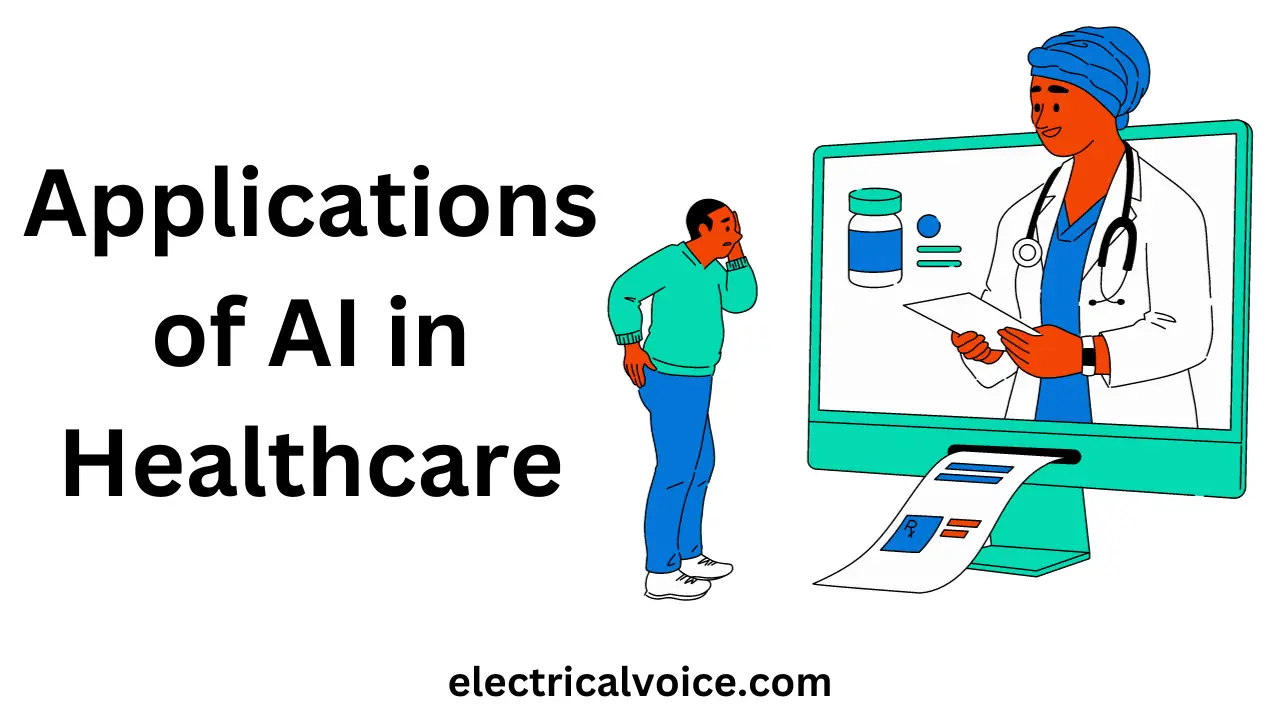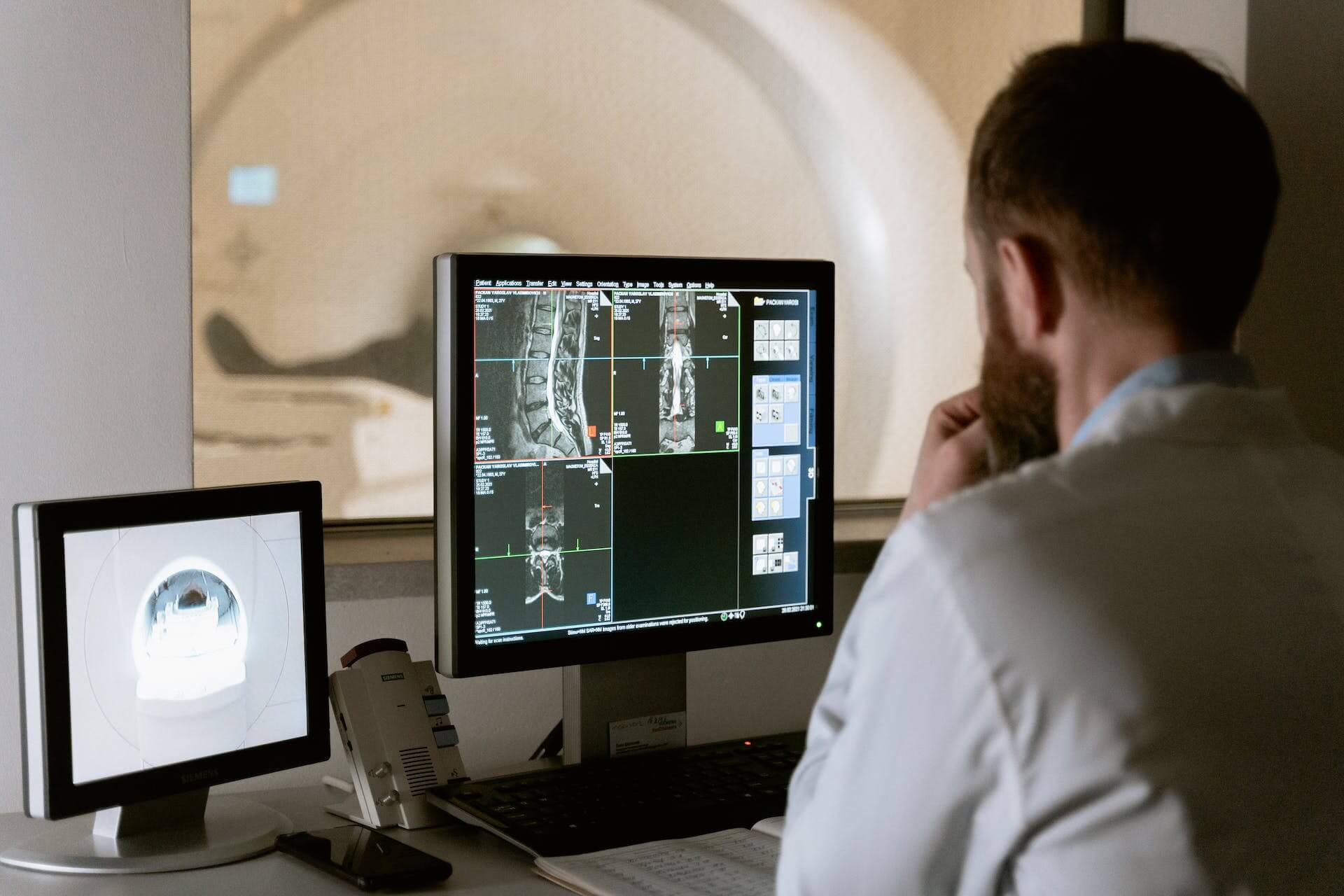In recent times, artificial intelligence (AI) has proven to be a transformative force across diverse sectors, including healthcare. Its capacity to analyze extensive datasets, identify patterns, and make informed decisions positions AI as a potential catalyst for reshaping our approach to healthcare. In this blog post, we will delve into the applications of AI in healthcare and how it is transforming the industry.

List of Applications of AI in Healthcare
1. Enhanced Diagnosis and Treatment
AI algorithms can analyze medical data, such as lab results, medical images, and patient records, with incredible speed and accuracy. This can significantly aid in the early detection and diagnosis of diseases, leading to more effective treatment plans. Healthcare professionals can make data-driven decisions by leveraging AI technologies, resulting in improved patient outcomes.
2. Remote Patient Monitoring
Continuous patient health monitoring outside traditional healthcare settings is possible through wearable devices, sensors, and artificial intelligence (AI). By analyzing data collected from these wearables, AI identifies trends, anomalies, and potential health issues, facilitating prompt interventions and personalized healthcare.
3. Robot-Assisted Surgery
AI-powered robots are increasingly used in healthcare settings to assist healthcare professionals in surgeries, patient care, and rehabilitation. These robots can perform complex procedures with precision, reducing the risk of human error. Additionally, they can provide much-needed support in areas facing a shortage of healthcare professionals.
4. Drug Discovery and Development
Developing new drugs and conducting clinical trials are time-consuming and expensive processes. AI can accelerate these processes by analyzing vast data and identifying potential drug candidates with higher success rates. This can revolutionize the pharmaceutical industry, leading to faster development of innovative disease treatments. Machine learning models can analyze genetic and molecular data to identify disease biomarkers and assist in personalized medicine.
5. Personalized Treatment Plans
Each person possesses distinct characteristics, and their healthcare requirements reflect this uniqueness. AI can contribute to customizing medical treatments for individuals by evaluating genetic information, lifestyle elements, and medical histories. This personalized approach can optimize treatment outcomes, reduce adverse drug reactions, and minimize trial and error in prescribing medication.
6. Healthcare Operations and Workflow Optimization
AI enhances operational efficiency by streamlining administrative tasks such as appointment scheduling, billing, and claims processing. Additionally, predictive analytics empowers hospitals and clinics to optimize resource allocation and staff scheduling, contributing to more effective and resource-efficient healthcare management.
7. Mental Health Support
Mental health support is facilitated by chatbots and virtual assistants, which offer counseling, monitor mood patterns, and alert healthcare providers to potential crises. AI-based applications further assist individuals in managing stress, anxiety, and depression through personalized interventions, contributing to enhanced mental well-being.
8. Population Health Management
AI analyzes large datasets to identify trends and patterns in population health, helping healthcare providers and policymakers make informed decisions to improve public health.
9. Telemedicine and Virtual Assistants
With the rise of telemedicine, AI has become an indispensable tool in improving patient care remotely. AI-powered virtual assistants can provide instant support, answer medical queries, and even offer essential diagnoses. This saves time and ensures patients receive prompt medical attention, regardless of location.
10. Predictive Analytics
One of the remarkable capabilities of AI is its ability to predict future events based on historical data. In healthcare, this can be a game-changer. By analyzing patient data and identifying patterns, AI algorithms can predict the likelihood of certain diseases or conditions. This enables healthcare providers to take proactive measures to prevent or manage these conditions, ultimately saving lives and reducing healthcare costs.
What is the future of AI in healthcare?

The future of AI in healthcare holds tremendous promise for transforming the industry in various ways. While the field is dynamic and continually evolving, several trends and possibilities suggest the direction in which AI in healthcare may develop.
- AI algorithms are expected to become even more proficient in analyzing medical images, aiding in earlier and more accurate diagnosis of diseases.
- AI-driven wearable devices and sensors may become more sophisticated, allowing for real-time monitoring of vital signs and health parameters in the home setting. Enhanced telehealth applications, supported by AI, could provide more personalized and proactive healthcare delivery, reducing the need for hospital visits.
- AI tools will continue to evolve as supportive tools for healthcare professionals, providing them with relevant information and insights to aid in clinical decision-making.
- Integrating blockchain technology with AI could enhance data security and privacy in healthcare, ensuring the integrity of patient records and facilitating secure data sharing.
- AI-driven analytics will continue to evolve for population health management, enabling more proactive and targeted public health interventions. Predictive modeling and analytics for disease outbreaks and epidemiological trends may become more accurate and timelier.
Can we trust AI in healthcare?
AI promises to transform healthcare through diagnosis, treatment, and enhancement of patient outcomes. Nevertheless, it is crucial to consider various factors related to trust.
Firstly, the accuracy and reliability of AI algorithms are crucial. AI models are trained using vast amounts of data, which can introduce biases or errors. Ensuring the diversity, representativeness, and quality of training data is crucial. Transparency in AI algorithms is equally essential, providing healthcare professionals with insights into the decision-making processes.
Secondly, AI should complement rather than replace human expertise. While AI can quickly analyze large volumes of data, it cannot interpret complex emotions or provide personalized care. Human involvement is necessary to validate AI-driven recommendations and ensure a holistic approach to patient care.
Thirdly, data privacy and security are paramount. With the increasing use of AI in healthcare, protecting patient information becomes even more critical. Robust security measures must be in place to safeguard sensitive medical data from unauthorized access or breaches.
Finally, continuous monitoring and assessment of AI systems are imperative. With technological progress, it is essential to conduct regular audits and evaluations to identify and promptly address any potential biases or weaknesses.
In short, while AI holds immense promise in healthcare, trust is contingent on accurate algorithms, human collaboration, data privacy, and continuous evaluation. By ensuring these factors are adequately addressed, we can harness the potential of AI to enhance patient care and outcomes.
